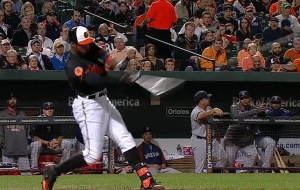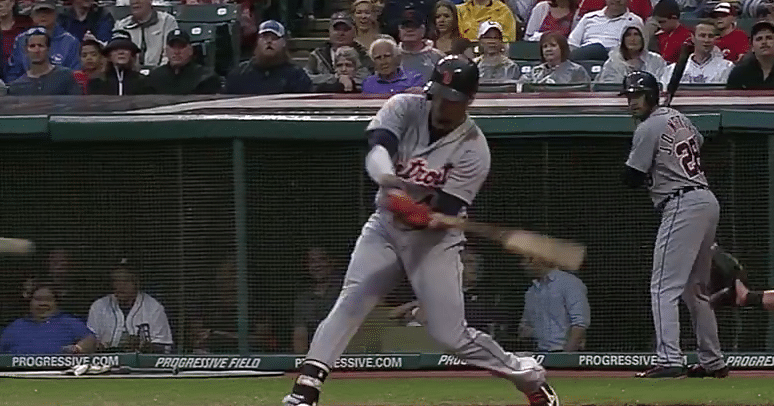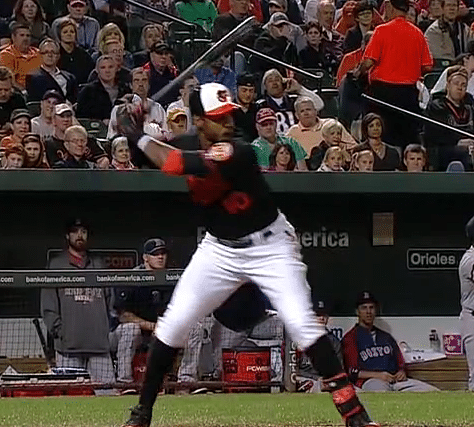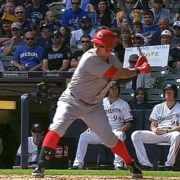Adam Jones VIDEO: High K%? Do These 2 Things…
Adam Jones: TWO Actionable Tactics To Decrease Strikeouts
I wanted to compare two hitters who have reversed walk and strikeout percentages. Adam Jones and Victor Martinez. Can efficient OR inefficient mechanics have an effect on a hitter’s strikeout rate? In this post we’ll:
- Compare & contrast key offensive statistics,
- Actionable tactic #1: how low can you go?
- Actionable tactic #2: bringing sexy back…
The clip I used of Adam Jones is him hitting an outside 90-mph fastball to center-field. According to FanGraphs.com Jones is 6’3″, 225 pounds. A BEAST! Whereas Victor Martinez is hitting an inside 93-mph fastball to right-center-field. FanGraphs.com lists V-Mart at 6’2″, 210 pounds.
Compare & Contrast Key Offensive Statistics
In this article I used Michael Brantley’s example, of how to boost Batting Average, or Batting Average on Balls In Play (BABIP). Although Adam Jones is a BEAST and does a lot right statistically speaking, there’s two mechanical elements that may lend themselves to improvement. In the following stat table I want to pay particular attention to:
- How virtually non-existent Adam Jones’s walk percentage is,
- How Jones’s Strikeout% fairs to V-Mart and the League Average, and
- The difference between both hitters’ Ground-ball% (GB%).
I’m using Victor Martinez’s mechanics as a model for Adam Jones. Why? When you want to reduce strikeouts, look to the guy who is the best in the game. Victor Martinez has hit 30 homers, as of this writing, and only struck-out a “lean” 39 times…ALL season. There are two key mechanical differences that I feel may be contributing to these numbers…
Actionable Tactic #1: How Low Can You Go?
In baseball, the mound lifts a pitcher’s release point by 10-inches. On top of that, the pitcher has to throw the ball to a squatting catcher. To increase margin for error, and cut down on strikeouts, a hitter’s body has to get low on the pitch plane early. THEN, stay on the pitch plane at least six to twelve inches passed impact. In other words, get shorter, and stay shorter.
Getting low isn’t as important with fast-pitch softball. The pitcher’s release point (mid thigh to hip) is almost on line with the catcher’s glove. The pitching rubber will remain on flat ground and same distance from the plate, so hitters will experience less pitch plane arc at the higher levels.
As you see in the video, Adam Jones gets low but doesn’t stay low on the pitch plane like Victor Martinez does. V-Mart starts low, glides forward, then stays low through his Final Turn. This mechanical inefficiency – of Adam Jones – may contribute to his higher than average GB%, Strikeout%, and virtually non-existent Walk%.
Actionable Tactic #2: Bringing Sexy Back
The Catapult Loading System NEEDS the following three ingredients, up to the Final Turn…hitter:
- Shows numbers (their back) to pitcher,
- Hides hands from pitcher, and
- Has a slight down shoulder angle.
These three ingredients charge the springy fascial connective tissue in the body.
Victor Martinez shows his numbers longer than Adam Jones does. I showed in this Tony Gwynn video that Gwynn keyed in on keeping his front shoulder in, which allowed him to stay on the ball longer. Keeping the “spring” loaded longer may explain the difference in the GB% above. Jones starts on plane, but finishes off (he “stands” up).
The key to efficient mechanics on a downward pitch plane is to get low. Evidenced in the video, also showing the hitter’s numbers longer can have a reducing effect on higher than average strikeout and ground-ball percentages.
- Master Your Swing: How to Choose the Best Baseball Hitting Training Videos for Immediate Skill Boost - February 28, 2024
- Mastering Advanced Baseball Techniques: Personalized Online Coaching Elevates Youth & High School Hitting Skills - January 17, 2024
- Master the Art of Batting by Doing the Opposite of What You Think - January 16, 2024
















Joey, correct me if I’m wrong, but it looks like Adam may initiate his rotation top down. It appears that at heel plant his front shoulder leads the rotation and at best it’s concurrent with his hip turn. Is one of the causes of a shoulder flying out early because there is no leading hip torque at heel drop? In other words, if heel drop isn’t follow immediately by the hips rotating you are back to zero movement. Then is it necessary to initiate movement top down, hence front shoulder flying open?
Thanks for what you do. I’m glad to see hitting theory/training coming out of the dark ages.
Thanks Max for the kind words. Yes, it was a long time coming for baseball/softball to come out of the Dark Ages. Now, the question is, are most ready for it??
About your observation with Adam Jones…remember, he’s a bigger guy, so he succeeds despite his mechanical inefficiencies. Efficient spinal engine mechanics have the shoulder and pelvis counter-rotating each other in dynamic movement. So the front shoulder flying open at the same time as the pelvis, waters down our body’s natural springy effect in transferring energy.
That being said, on this particular pitch, he could’ve been late getting to the pitch, so flying open with the front shoulder could be a results of that. Not landing shorter, could be a cause too. With my hitters, I found them flying open when they stride towards the plate – crash – and/or land with a closed front leg and foot. The pelvis is blocked from opening, so in order to get the barrel to the ball on time, the brain delegates to open the front shoulder prematurely.
What’s been commonly taught for so long – stride closed – has led to a pandemic of flying open front shoulders across the world. The pelvis must remain in neutral during the fall (or slightly open), and be ready to open at landing the Fight Position. The shoulders on the other hand, must be counter-rotated (showing pitcher the numbers) before landing to load our springy connective tissue and execute proper spinal engine mechanics. Great question Max!
When video first started I instantly thought of Tony and how he stayed low from what I remember of him and then you mentioned him
Scott – Tony? Tony Gwynn? Or Victor Martinez?
So hips start before front shoulder starts!!!! Is that what your saying!!! Just trying to understand!!!
Yes sir! But in order to get this to happen, we have to pre-load the torso with tension, and that’s where the Catapult Loading System comes in.